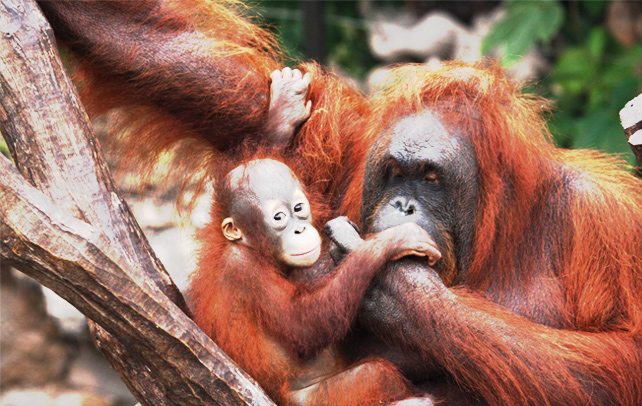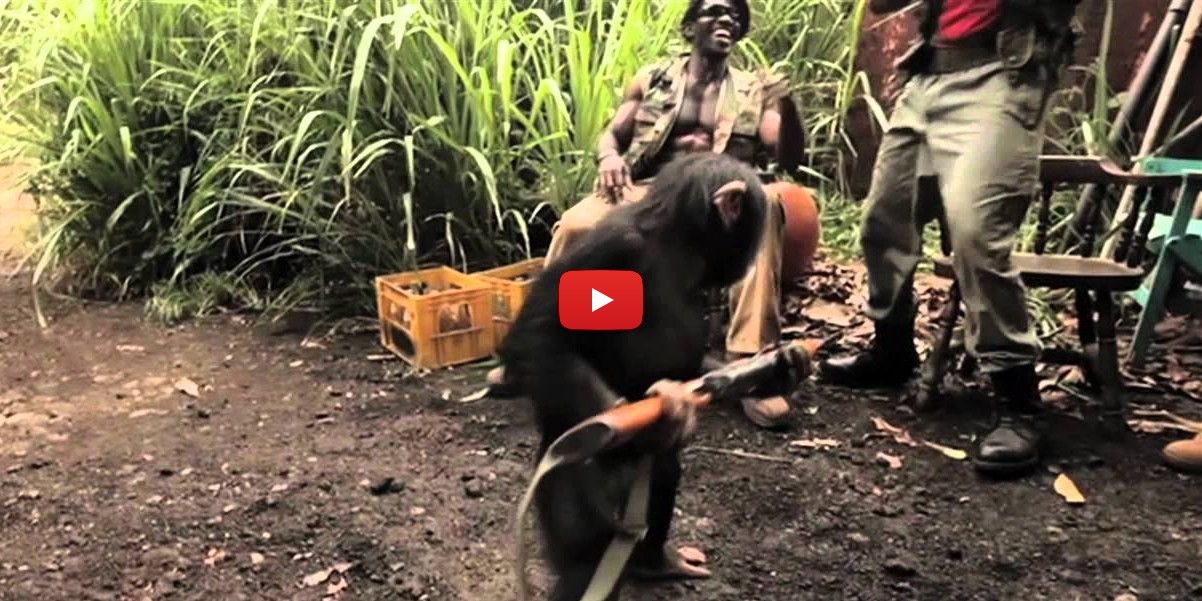Amazing Facts About Orangutans

Orangutans are among the largest living arboreal animals; they have proportionally longer arms than the other terrestrial and great apes. The word ‘orangutan’ has been derived from the Malay words “orang” (man) and “(h)utan” (forest); therefore, they are also known as ‘man of the forest’. They are counted amongst the most intelligent primates and use a variety of sophisticated tools. With their intelligence factor they make sleeping nests each night from branches and plants. The colour of their hair is reddish-brown which is different from other great apes who have either black or brown hair.
Orangutans are the only exclusively Asian genus of existing great ape and are native to Indonesia and Malaysia. Orangutans are currently found only in rainforests on the islands of Borneo and Sumatra, though their fossils have been found in Java, the Thai-Malay Peninsula, Vietnam, and Mainland China. Presently, only two endangered species of orang-utan are surviving: the Bornean Orangutan (Pongo pygmaeus) and the Sumatran Orangutan (Pongo abelii). The subfamily Ponginae also includes the extinct genera Gigantopithecus and Sivapithecus. Read on to check out some of the facts about Orang-utan.
Fast Facts
Scientific Name: Pongo pygmaeus
Kingdom: Animalia
Phylum: Chordata
Class: Mammalia
Order: Primates
Family: Hominidae
Subfamily: Ponginae
Genus: Pongo
Type Species: Pongo pygmaeus
Species: Pongo pygmaeus and Pongo abelii
Origin: Asia
Diet: Mainly fruits (with sugary or fatty pulp), along with young leaves, shoots, seeds and bark, insects and bird eggs
Size: Height (males): Around 175 cm (5 ft 9 in)
Height (females): Around 127 cm (4 ft 2 in)
Weight: Female: 30 to 50 kg
Male: 50 to 90 kg
Colour: Reddish-brown
Natural Habitat: Rainforests, on the islands of Borneo and Sumatra
Lifespan: 35 to 40 years
Age of Maturity: 12 to 15 years
Gestation Period: 8 to 9 months
Number of Offspring: One
Amazing Facts About Orangutans
- Organutan almost resembles like a human being and therefore in the earlier times people thought it as a person hiding in the trees, so that nobody asks him to go to work or become a slave.
- Orangutan is the only ape that is strictly arboreal.
- Orangutan is the largest tree-living mammal in the world.
- An orangutan baby has the longest dependent childhood. It is dependent on its mother for approximately six years, and even more.
- Maturity age of an orangutan female is 8 years and 5t can give birth only once every 8 years—the longest time between births of any mammal on earth.
- A male orangutan uses its throat sac to make a very notable call that echoes through the forest. It helps either to find and announce their presence to females or to warn away other males.
- The hands of an orangutan are very much similar that of humans. They have four long fingers and an opposable thumb. They have a vast arm span. A male orangutan can stretch its arms as much as 7 ft (2.1 m) wide from one fingertip to another.
- Orangutans are very intelligent mammals. They have been famous to use big leaves as umbrellas in the rainy season, and as cups to help them drink water.
- Every evening, oran-utans construct a nest with leaves and branches on the trees. When the night falls, they curl up and sleep in these nests just like man settles his bed before going into it.
- Orangutans cannot swim.
- Orang-utans are active in the daytime and spend most of their time looking for food.
- The arms of orangutans are incredibly long and almost reach down to their ankles.
- Orangutans are lonely animals, which generally come together only to mate and then part ways again.
- When an orangutan gets older, its face starts developing cheek pads and the throat starts getting a pouch.
- Orang-utans have 32 permanent teeth (the same amount as humans). They have sharp canine teeth and the male orangutan has longer canine teeth that they use for threat displays and fights.
- Baby orangutans cry when they’re hungry, whimper when they’re hurt, and smile at their mothers just like human child does.
- Legend is that orangutans can speak, but choose not to because they fear that they would be forced to work if caught talking.









